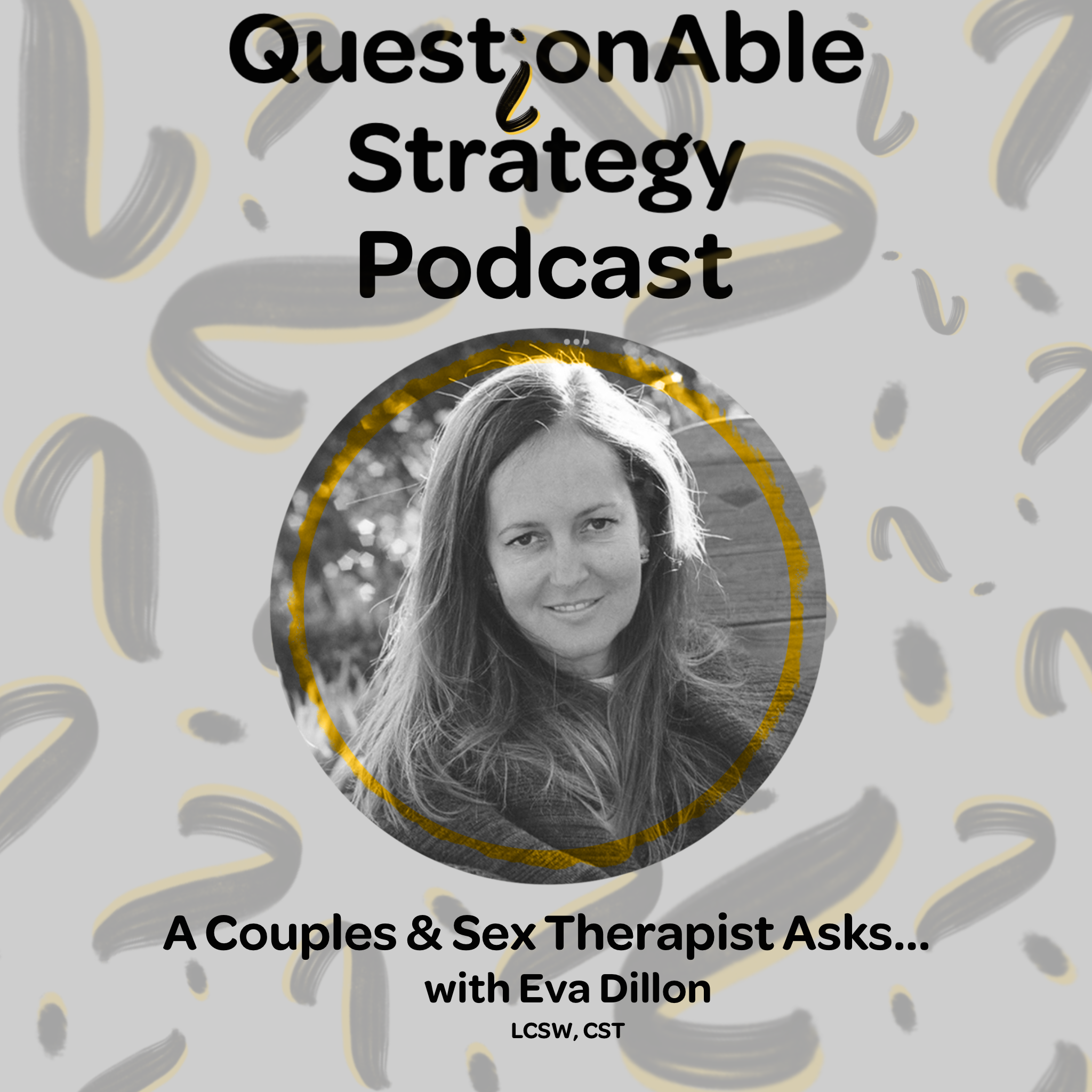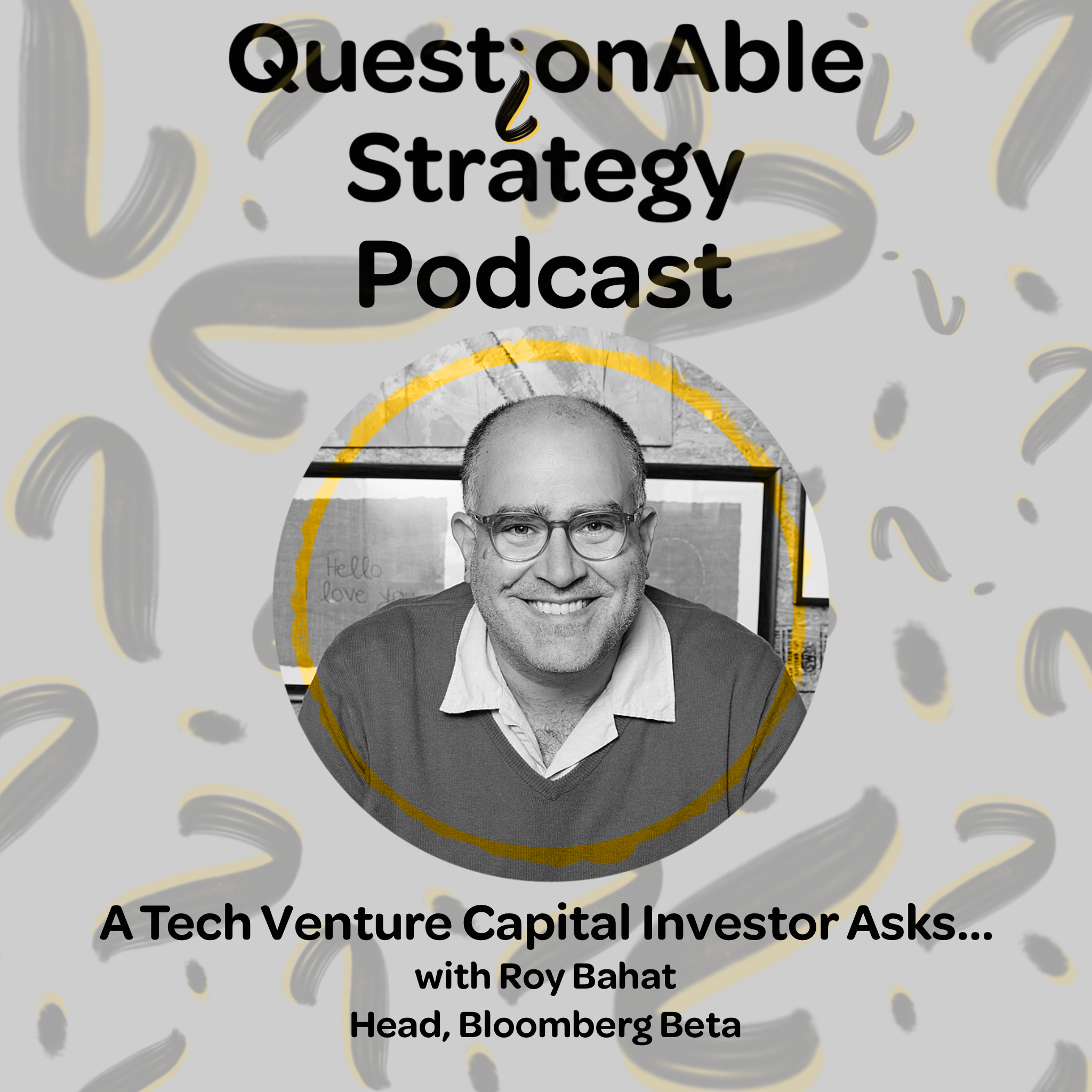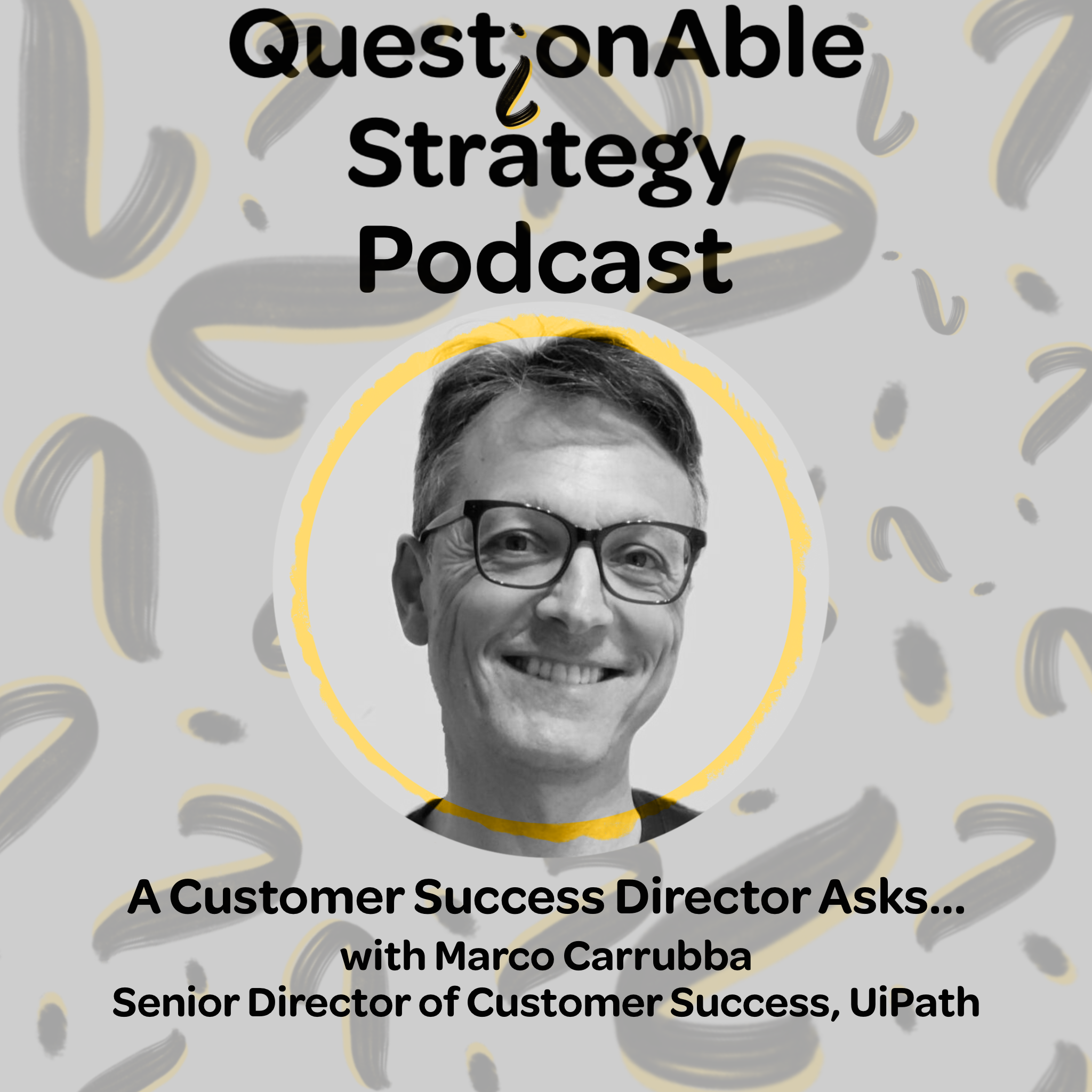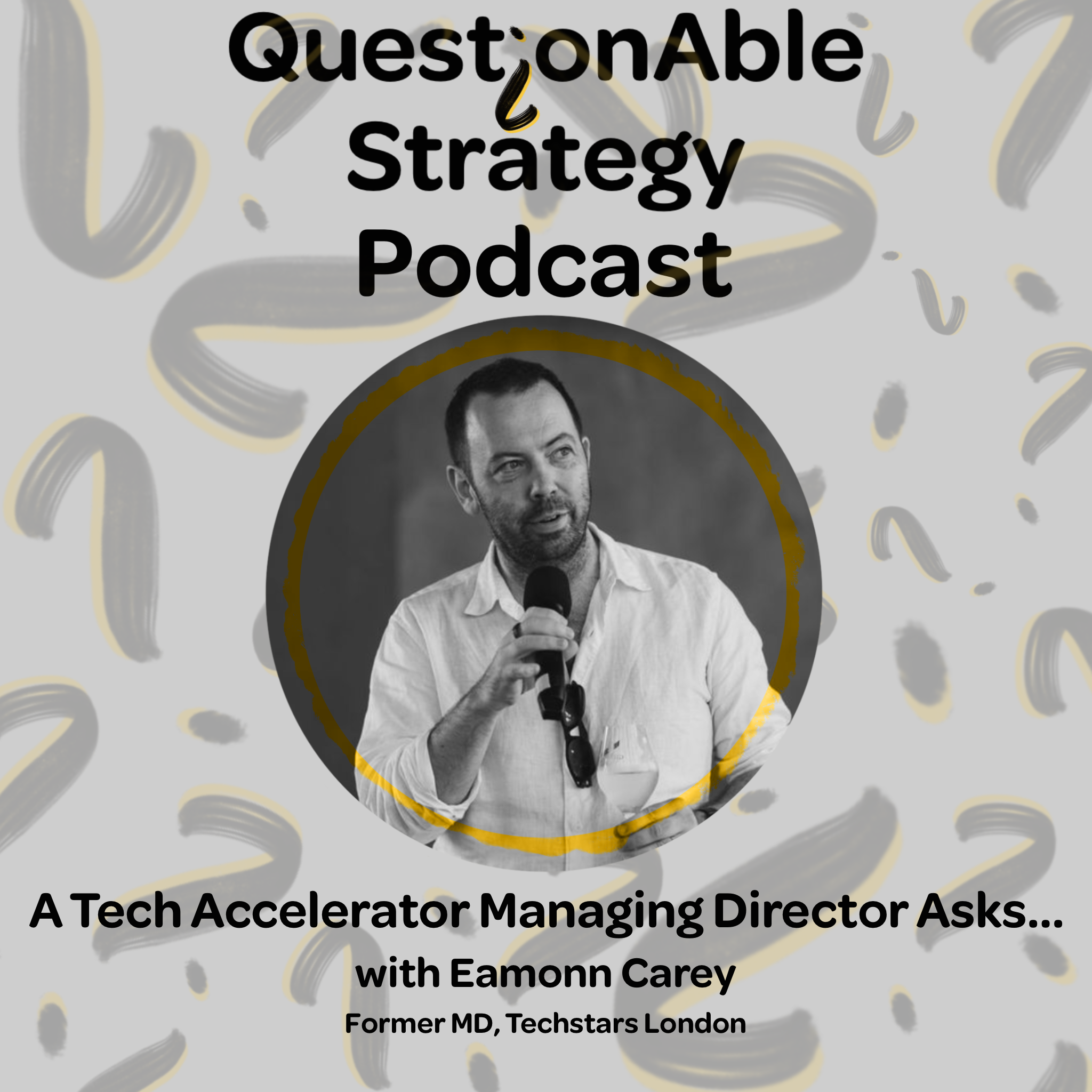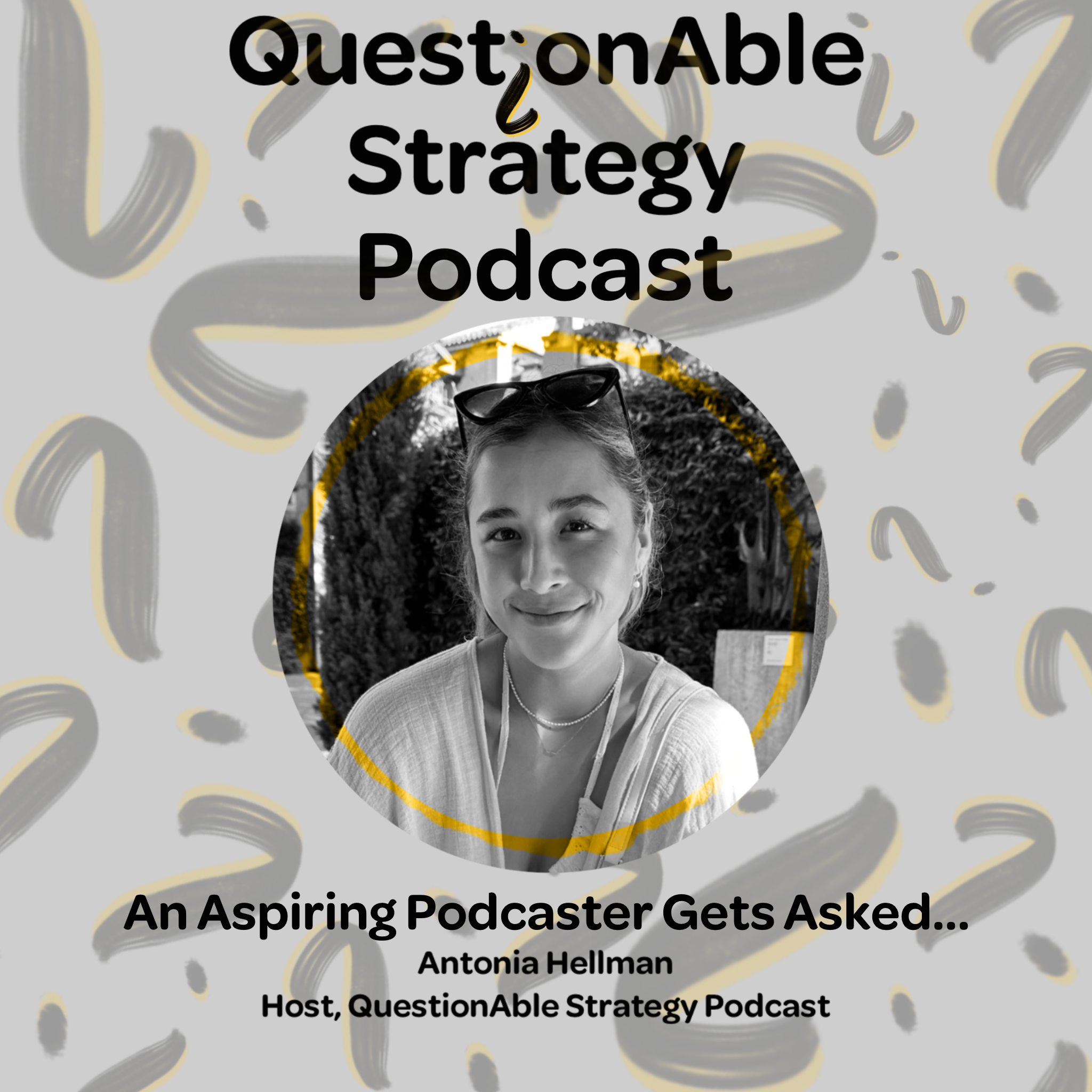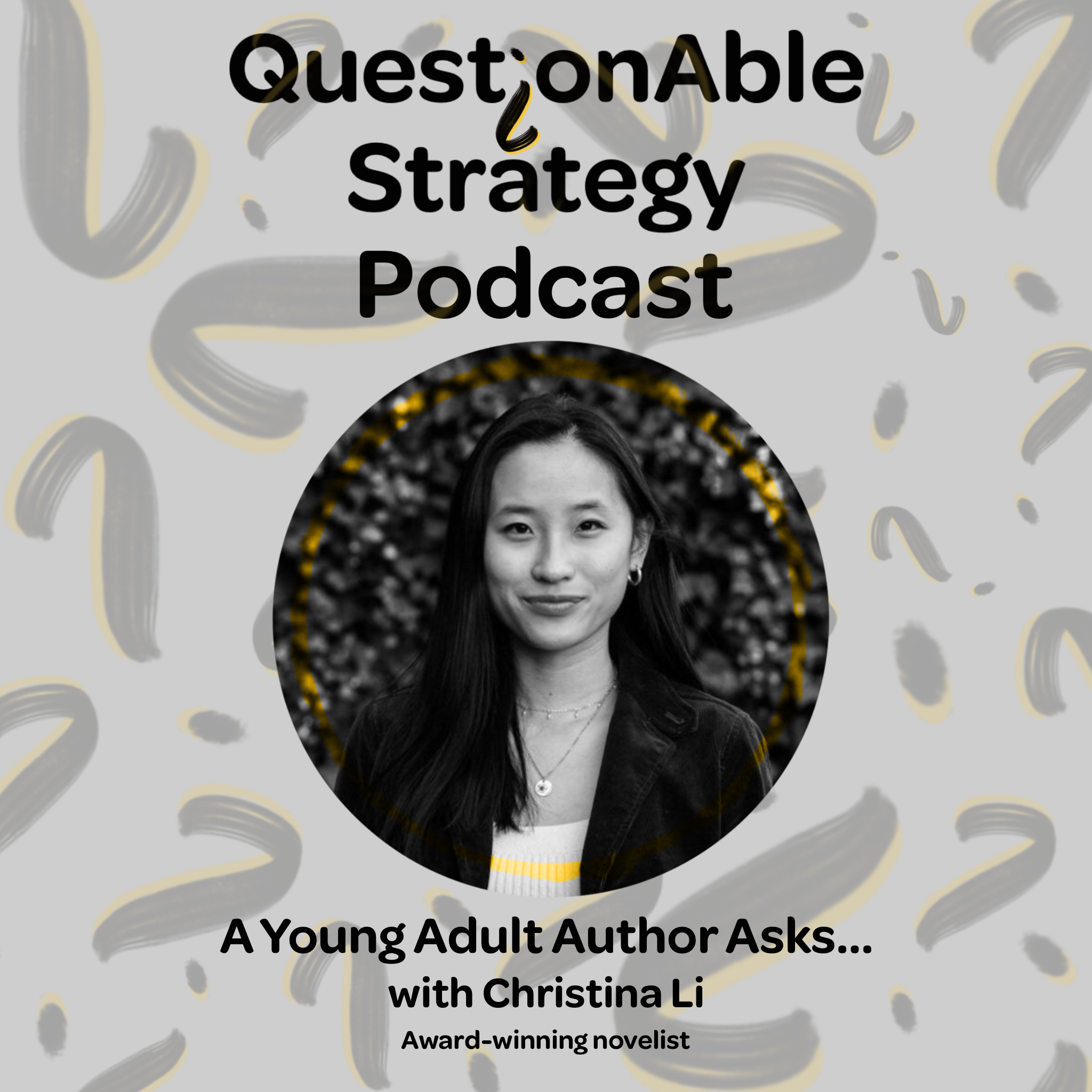Episode Transcript
I usually begin with a question I learned from Suzanne Iasenza, a sex therapist and colleague. When did you first feel like a sexual being? If I'm working with someone. Who seems very uncomfortable talking about sex. If I'm working with someone from an extremely conservative background, my first questions might be a little bit different. I'll be slower and more gentle. What kind of a kid were you growing up? What was your temperament like? What did you look like? And then I'll ask, how did you learn about sex? Hey everybody. It's Antonia with another episode of QuestionAble Strategy and the voice that you just heard was Eva Dillon, who is a couples and sex therapist in New York City. She helps individuals and couples working through challenges with intimacy, dating, infidelity, nontraditional relationships and mental health as a whole. Her approach to therapy is sex positive, makes sense, and both kink and LGBTQ affirmative. So we get to talk about all of that in our conversation and more. Now, I really didn't know what to expect when going into this conversation, I just knew that it would be a fascinating one because couples and sex therapists need to ask some of the most intimate personal questions in a way that gains their clients trust. And that's a really difficult needle to thread. That's an art form. And so in my conversation with Eva, we talk about questions that she asks, how to communicate better, tips that she has for couples. And it's honestly everything that I could have hoped for and more. So I don't want to wait any longer to share it with you. This is how a couples and sex therapist asks questions. Here is my conversation with Eva Dillon. Eva, this is a long time coming. I'm so thrilled to have you as a guest. I'm glad to be doing this. I want to start off by asking you, on a very high level, what roles do questions play in your day to day work? Therapy is a dialogue. It's an inquiry, through questions to assist my clients develop a better understanding of themselves and others. The therapeutic relationship is unique. It's not symmetrical. I'm asking lots of questions. I'm learning a lot about my clients. I'm revealing very little about myself. I feel really honored that my clients are sharing their stories with me. The goal is to make our emotions and feelings that we're often not aware of or not in touch with at all to, to make these explicit. So that we have a choice about how we respond, I really liked that. The hard part here is people come in to your office or they do a video call with you and it's your responsibility to take all of the hidden bottled up stuff that they've got inside of them and turn it into words, but not just a narrative, but it actually needs to, come from them with a realization or some kind of epiphany of what those emotions mean to them. Yeah, it's making them aware of what they're feeling. Many people are not in touch with what they're feeling at all. One of my favorite defenses is intellectualization. We're often spend a lot of times in our minds and really what, what's going on inside. What are we feeling? What are our emotions? And how do you go about using questions to tap into those really strong emotions? I listen in a couple of different ways. One is reflective listening and one is experiential listening. There's a lot of, reflective listening and my stance is curiosity, I'm working hard to have a therapeutic alliance with my clients. I am listening empathically and I'm reflecting back., which sounds so simple, but can make the client feel understood, accepted, supported, and taken care of ideally hopeful as well and can deepen emotions. Practically, does that look like your client will say something, and then you're very conscious to repeat some of what they've said back to them, just to show them that you've been listening, Sometimes I am using their language because that can be powerful. And I'm checking in all the time in a very caring way. I'm hearing this, am I getting it right? There's lots of validation and I'm normalizing what they're feeling and yes it allows them to deepen whatever they're feeling. At the same time, I'm also modeling this behavior. I'm modeling questions. I'm modeling listening. Whenever a couple goes into therapy, they all have the same goal, which is to learn to communicate better. So this process of reflective listening and also experiential listening, which is an even deeper kind of listening they're both they're serving another role. They're modeling this kind of deep communication, Sure. So I learned about experiential listening from a colleague Peggy Kleinplatz in Canada. She is someone I've trained with many times. I attended a workshop of hers at the beginning of my career, and it really informed my work and my focus. She studied magnificent lovers to see what they were doing right. Her mentor was Alvin Mahrer, or Al Mahrer, who was the founder of Experiential Psychotherapy and so Mahrer wrote about listening with three sets of data, bodily sensations, images, and feelings. Experiential listening is listening so closely. That I'm letting myself inhabit my client's world. I'm asking my client, what is happening inside? What are you feeling inside? Then I'm curious as I'm listening, I'm curious about what's happening inside my body. Can I listen so deeply and empathically I also feel the same sensations in my body? I'm sure you've had the experience of listening to a friend's story about something they've been struggling with and having tears come to your eyes. Absolutely. So you were so attuned in that moment that your body responded. And the third set of data is feelings, what the client is feeling. I'm listening so intently, my client's feelings become my own. This kind of listening is cathartic and enables the client to process feelings and move into a better space. I think that's so fascinating to learn about because what people often forget when we talk about questions is that more than 50 percent of asking a great question is listening. And so, if we can teach ourselves. To listen better and there are multiple different types of listening, then that will inform how we go forward and ask questions and try and learn more about other people So how do you think the experiential listening aids your questioning when you're working with your clients? My clients can really tap into what they're feeling. If I've been working with one member of the couple and they've gone deep and have been very vulnerable, it can be a powerful experience just for the partner to witness it. If I feel the partner will be receptive, I will turn to them and ask them, is this news to you? Did you know your partner felt this way? And if they respond in a positive way, wow, I didn't know, I'll ask them to turn to their partner and share that. Can you turn to your partner and tell them what it was like to experience this or to hear this? Similarly, sometimes I'll ask the partner I've been working with, can you turn to your partner and share what you just noticed or what what you're feeling right now? And again, if I think the partner will respond in a positive way, I'll ask, what was it like that your partner shared this with you? These can be very connecting moments and they can be corrective experiences. The sharing and the safety of that deep sharing can be a new experience. It's great that you brought up safety, because I think that's a vital component of asking any question, really. Otherwise, people might clam up and retreat back into themselves. How do you make sure, from the beginning of working with clients, that you create a safe environment for them? Does safety look different to different types of people or have you found that there's one recipe that works for everyone or most people? Yeah, if only, safety is very important for everyone, but we're all unique. We need safety to be vulnerable, to surrender, it's part of building a therapeutic alliance and being very attuned. And it's important for the client to feel safe, connected, understood, and that's not something you establish in the first session or two. That's ongoing. You mentioned early on, that when you're working with clients, they're telling you a lot about their lives and they're sharing very personal stories and emotions, but you're not sharing much about yourself. And usually when we think about relationships, it requires a two way street, right? But a therapist client relationship is very different. How do you make sure that you create such a strong connection deep trust when they don't know anything about you? I'm very curious and I'm, caring and I'm authentic. And that's how there's safety and trust. It's a different kind of relationship. Yeah. When you're just getting to know a client, what are the first questions that you tend to ask them? Some of the questions I ask in the beginning are what brings you into therapy? Why sex therapy now? How can I help you? What supported you in beginning couples therapy now? On average couples wait six years after a struggle begins to enter into couples therapy and that is too long. By that time patterns have become very entrenched and it makes the work more difficult. So I'm always curious about when the struggle began. What's the history of the struggle? What have you tried? What has been helpful? What hasn't been helpful? What are you wanting to be different? What do you want to change? What hasn't been working in your relationship? What are you wanting as a couple? What do you want for yourself? What do you want for your relationship? What do you want to move towards? What changes do you want? I can imagine that a lot of folks come in to see you just acknowledging that they have a problem or that they're struggling with something. If they don't know exactly what it is that they want out of working with you, how do you ask questions to figure that out? Not just for yourself, but for them as well. In my experience, most of my clients are aware of their struggle and what they should be working on. I think we're really pretty good at knowing what we should be doing. Sometimes we just need a catalyst to support us in getting where we need to go. I'm assuming my clients are open to change and that's why they're there. And I, I think everyone is willing to grow; I think everyone has a longing to grow. And if I didn't think that I couldn't be a therapist. think something that a lot of people struggle with though now more than ever with social media and everything seeming like it's being broadcast I can imagine that there are a lot of people, myself included, who think. That our behaviors or our feelings are abnormal, when in reality, they're very normal. It's just not what people demonstrate to the world. What's your experience with that, and how do you get an understanding of, how your, clients perceive their problems? I'm so glad you asked that. One of the best books about sex therapy and the best book about female sexuality is Emily Nagoski's Come As You Are. She was a sex educator at Smith and she tells a story about the first class she taught. So these are really very bright, already well educated young women. At the end of the class, she asked them, what did you learn that was most meaningful to you? And half of them wrote that I'm normal. Wow. So yeah. So a lot of my work is normalizing. It's very powerful. On the topic of normalizing, you work with a lot of couples, every couple goes through their own, issues, Sure. How do you convey that sense of normalcy to a couple when they feel like they're in distress? There was a great article in the Times recently. I'm not sure if it was about myths about relationships. I think it was myths about sexuality. And one of the myths was everyone is having more sex than you are. And this is a great thing to normalize. It's how much sex people are really having a lot of couples come to me because they're not having as much sex as they want, or some of them are coming to me because they're not having any sex. They haven't had sex in a year. They haven't had sex in six years. The definition of a sexless couple is a couple that has sex less than 10 times a year. So I try to normalize how much sex other people are really having and explore how much sex do you want to be having? What is your sex like? Is it pleasurable? Maybe we just need to work on a couple having sex worth wanting. I asked that question before because I'm really curious about how blame in particular factors into this concern with normalcy. Because if you're experiencing issues as a couple, if it's not normalized, our first thought is, oh, it's, the other person's fault. And I think that can manifest itself in a lot of other negative feelings. And I wonder, how you ask questions to get at the root of those feelings while normalizing the experience that they're going through. So one dynamic that's taking place in many of the couples who come to see me is one person in the couple will be a pursuer and the other one will be a withdrawer. And sometimes both both people in the couple are coming into sex therapy and telling me, can you fix, can you fix my partner? So this reflective listening and exploration about what the person is experiencing in this dynamic can be very heplful. Often the pursuer Is really just protesting the lack of connection. Their partner might be experiencing it as being hounded or pressured. It comes across as being clingy, or desperate. Yeah. If they really talk about their feelings and their partner hears it as a longing for closeness and connection, it's a very different experience for them. And will soften their defenses ideally. And will give them compassion and empathy for their partner and might be receptive next time their partner reaches for them, even if they're reaching in a way which in the past hasn't been successful. Mm hmm. Because you've exposed the underlying motive. Yeah. And so then when I turn to the partner who's the so called withdrawer, and I'm asking questions about what they're feeling when they exhibit this behavior. It's often sometimes not knowing how to respond and just not wanting to make the situation worse. Sometimes that's just their tried and trusted survival mechanism, which is withdrawing out of fear of being rejected. So again, when their partner hears that, that can give them deeper understanding and be a corrective experience. I'm hesitant to call it a stereotype and I'm hesitant to call it a joke but a lot of people think of therapists as being people who, you know, whose couch you sit on, and then they ask you, and how do you feel about that? And how do you feel about that? And how do you feel about that? What do you think of that stereotype? And do you also think that it can be really effective? I say that a lot and I try to think about different ways to ask it, but I do, of course I ask it because it can be really powerful and I'm curious. I want to know how they're feeling. Yes, I do ask it and I, I have to stop myself from asking a lot in my private life. But yes, The stereotype is true sometimes. I think of that question as being therapist's ice pick, if you will, right? Because it's, the more you ask that question, the more you force your clients to really dig deeper inside themselves. So as much of a trope as it might be, that's what therapists do. They do that for a reason because it peels back the layers of an onion, but something that you mentioned is that you try and stop yourself from doing that in your personal life, and I want to know if, as a therapist, you've found that sometimes people, your friends, your family, are a bit more reserved around you because they know that you're a therapist, and they're afraid that you're gonna Psychoanalyze them and have you found that in your life at all? Sometimes I just can't resist, I can't resist I am curious and I've just got to ask, how does that make you feel? Yes, I know it can be a rich question but yeah, some people do resist it. Some members of my family resist it, Are there some people who run towards it and get extra excited about it because it's almost like a free therapy session? Yeah. that is an aspect of some of my relationships and I hope it's, as enjoyable for those people as it is for me. It means a lot to me. Over time, thinking back on your personal growth, how do you think that your career training has influenced the way that you think My work has, I don't know if it taught me to be more present or the act of being more present with others made me want to do it more, in other parts of my life because it is, so meaningful. When I'm with my clients, my job is to be present and authentic and curious. And that has spilled over into other parts of my life. Some of the other things from my work that have affected me during COVID, which was such a hard time for so many, at times when I really noticed I was struggling, it was a real opportunity to do all the things I tell my, like my clients to do to get up and meditate and stretch and be in nature, get enough rest, have meaningful connections with people, all of these things. I guess maybe they were just more available to me because of my work. I I think that's actually something that makes you an excellent therapist. I would not go so far to say that I am a therapist in any sense of the word, but I do enjoy listening to my friends and I enjoy helping them solve their problems. And I find that a lot of the advice that I give is extremely logical and it makes a ton of sense. Yet when I'm experiencing those same problems, I never take that advice. So I'm going to be the first to say that a ton of the advice that I give is just stuff that I wish I could take, but I can't, and it's nice to hear that the advice that you're giving is advice that you are also taking. At times, yeah. Um, And it was how exciting to discover that these things all really do help and they are helpful and can support you and protect you. But of course I don't always, live in this way. Sometimes I enjoy Watching TV and eating junk food too. Yeah. We're all normal. Eva, it's nice to know that you're a normal person, too. Yeah. but speaking of normal people, I want to jump into focusing a bit more on a topic that I know that you're really passionate about, which is sex. I know that when it comes to questions about sex, this can be a really difficult topic for a lot of people. So, what kind of questions do you ask to your clients who are visibly not that comfortable talking about sex? Sex is a very sensitive and private topic, and most people find it difficult to talk about sex. So I name that from the start. Sex is difficult to talk about. And then I begin talking about it in a very matter of fact way. I'm very comfortable talking about sex so I'm modeling it and I'm hoping that the way I talk about it is an invitation for my clients to join me in it. I'm very explicit when I talk about sex, I name body parts. I talk about the importance of sex. Maybe you're familiar with the Esther Perel quote, the quality of our lives ultimately depends on the quality of our relationships." Sex is the glue in our relationships. When we are sexual with a partner or even with ourself, the next day we have greater personal satisfaction, greater relationship satisfaction. We are more productive. We are happier. Interestingly, we also have improved communication skills and intimate relationships the day after we've been sexual. Also sexuality adds 15 to 20 percent to relationship vitality and satisfaction. Paradoxically, a non sexual relationship is a powerful drain playing a 50 to 75 percent role. that's fascinating because that means that sure, sexuality is additive, but there's also a major risk when it comes to not having a healthy sex life. Yeah. That's gonna be the downfall of a relationship. So to all those couples who are coming to you to try and improve their communication, it seems like sex is a big component of that. I mean, that sounds wonderful, but what if people come to you and They are deeply uncomfortable. Are there any questions that help you gauge how comfortable somebody is with talking about sex? When I begin talking about sex, I'm, yeah I'm really attuned to how they're responding. So an important part of sex therapy is taking a sexual history. The entire sexual history is really about how did you learn about sex And I usually begin with a question I learned from Suzanne Iasenza a sex therapist and colleague. When did you first feel like a sexual being? If I'm working with someone who seems very uncomfortable talking about sex. If I'm working with someone from an extremely conservative background, my first questions might be a little bit different. I'll be slower and more gentle. What kind of a kid were you growing up? What was your temperament like? What did you look like? And then I'll ask, how did you learn about sex? I want to know what their journey has been, and I want them to understand how they've become the sexual being they are today. I ask about their parents because kids watch their parents very closely. And our parents are our template for a relationship for a sexual relationship. Did you see kissing? Was there handholding? Were your parents in love? If so, how did you know they were in love? Were emotions talked about in your family? Did your parents take afternoon naps together? Did they have separate bedrooms? How was sex handled in your home? Was it avoided? Was it talked about? How was nudity handled? I ask everyone about sex education. If there was any sex education at school? But if there was sex ed in school, what was the quality of what you learned? Was it abstinence based? Was there ever a mention of the word pleasure? Were you one of the first kids to develop? What were some of the messages you got about sex and from whom? What messages did you get from your family, your community, culture? What religion are you? Can you tell me what that means to you? I ask about sexual taboos in the community. What were the unspoken rules about sex in your family? Unspoken rules about sex in your community. When did you first have sexual feelings in your body? When did you first start to think sex was good or bad? What was your first sexual experience with someone else? You know, things like making out, playing spin the bottle, people if kids still play spin the bottle? I'm sure, I'm sure they do. I hope so. I hope so. If there's one takeaway from this, from this, it's that kids should play spin the bottle. Yeah. Shout out to spin the bottle. Big shout out. yeah. Did you see Playboy or Penthouse? Maybe I'm dating myself asking that. Of course I ask about when did you first see porn? Later, I might ask, about their current relationship to porn now. I ask about sexual boundary violations. One of the most important parts of the sexual history is an exploration of core erotic themes. This term comes from Jack Morin's book, The Erotic Mind. He writes about the internal blueprint for arousal each of us has. My question might be, is there anything you find yourself drawn to again and again? We know many interests, fantasies are imprinted when we were very young. What do you think made it so exciting? I ask what my client's sex life was like in high school, what it was like in college. Then I, there, there's a favorite question I ask, what is your most erotic memory? What was your most erotic experience? And you'd really, you'd be surprised about the answers. Because I can imagine that not all of them are crazy sexual experiences. It can be something really tame, even, that just has a lot of emotional and sensual weight attached to it. Right? Yeah, it's not the steamy scene from a Hollywood movie you might imagine at all. It's often making out on the couch in high school, which reminds me of another idea from Jack Morin's book. He came up with this equation: attraction plus an obstacle equals desire. Sometimes our most erotic memories involve an obstacle like that, they can make these memories more erotic, hotter. Then I ask about relationships. What was your first relationship like? Of course, I ask questions specific to their current struggle. For a couple who wants to be more sexual, I'll ask, what is your understanding of the barriers to sexual intimacy now? I'll definitely explore what sex was like at the beginning of their relationship and how it's changed. I'm a lot more hopeful about a couple that had a rich and satisfying sex life in the beginning if they never had great sex, I'm a lot less hopeful about them That makes sense. It does yeah, no, that's You want to have good sex in the beginning. It's a good sign. It's a good sign for, good sex throughout the relationship, really. You don't Absolutely. You don't want to go into a relationship thinking, I could fix this. No. very Good to know. I'm glad this came up. you can't, you can't fix it. You want it to be exciting at the beginning., yes, you want that spark in the beginning. It's really important. I have more and more young couples that are really not prioritizing sexual attraction. They have good friendships, and maybe I don't know if they are thinking they can fix it or it will improve, but yes, that initial spark is very important. I have a question about this sexual history because it seems to cover a very long timeline. When you're asking these questions in the first session or few sessions, once you've gone over all of these questions, where do you prefer to start? Do you start by talking about the present, or do you bring it all the way back? We talk, if it's an individual client, we explore what the process was like. Sometimes it's one session. Sometimes it's six sessions and it can be a very therapeutic process. And if I'm working with a couple, I'll be doing their sexual histories. I like to do them separately just because I get more information. And at the end sexual history, I will ask the client is there anything you really want me to share with your partner about this experience, about your sexual history, as well as, is there anything you'd rather I didn't share? And then we will have a session together and share relevant information. It's not where my brain initially jumped to, but I love what you said about at the end of all of this questioning, asking somebody about how they felt going through that process. So it's, it has less to do with, okay, let's sit down and solve your problem right now. And more to do with, how did you feel about talking about all that stuff? And how did you feel about the questions that I asked? And that's a little bit meta. Oh, yeah. Yes, and At the end, I will ask Is there anything I missed? Is there anything you wish I'd asked? Is there anything you're glad I didn't ask and that I should ask? that would push somebody out of their comfort zone for sure. I like that question. Is there anything you're glad that I didn't ask? Because that honestly might be the root of a problem. Flipping the script I know that a lot of people might have misconceptions about sex or might not understand a lot of concepts when it comes to sex. What kinds of questions do you get asked? And how do you make sure that the environment is comfortable for people to ask you those questions without feeling dumb or ignorant or uninformed? I invite any question. A lot of my work is psychoeducation because sex education in this country is abysmal. So I will sometimes almost have a birds and the bees talk, or I will send them a resource, which is, sex education 101. And I do end up having a lot of conversations about pleasure. It's not something that usually comes up in sex education. And yes, with young women, the work can be exploring their sexuality, connecting with their sexual selves, experiencing pleasure on their own, getting to know what they like. This can be very helpful on its own, obviously, but it can also be helpful in a relationship. There's some questions I wish people ask me, or there are questions that I'm delighted when they ask me. Why do people cheat? Why do people leave their relationships? How do I know if a partner is right for me? Is it possible to cultivate desire? But my favorite question to be asked is how can I have better sex? Alright, Eva, I want you to hit me with all of the things that people can do to have better sex. Please. Talk about sex. It's one of the easiest things you can do. Another small thing you can do to really improve your sex life is get a good night's sleep. Cuddle after sex. Research shows if you cuddle after you have intercourse, you're more likely to think it was the best sex ever. Don't go more than two weeks without having sex. If you do, touch starts to feel awkward. Oh, clean up your room. Looking at a pile of laundry is not an aphrodisiac. Have, you know, just create a space that is conducive to connection. Oh my gosh. That's iconic. Clean your room! Clean your room. Clean your room. Your mom was right. So yeah, thank you for giving me the opportunity to share a few ways we can enjoy better sex. Of course. Something too that is special about the way that you work is you're. specialized in various different communities, like the LGBTQ community. You also work with older couples. How do you approach working with different groups and communities, especially ones that you personally might not be a member of yourself? I approach it with a lot of curiosity and humility. I really enjoy working with older couples. I wish I got to more. and I think I mentioned that Peggy Kleinplatt studied magnificent lovers to see what they were doing right. One of her findings I found most inspiring is great lovers are made and not born. Her research showed that on average, magnificent lovers became magnificent lovers at age 55, which is a good age She studied Magnificent Lovers and came up with eight components. And Many of the, lover she ended up studying were over 65 and had been partnered for more than 30 years and they were magnificent because they were having optimal sexual experiences in their 60s into their 70s and even in their 80s Okay. So we should all go and check out those eight secrets Yes. I'm happy to share what the components are. Yeah, please. Being present, focused, and embodied. Connection, alignment, and merger, deep sexual and erotic intimacy, extraordinary communication and deep empathy. Exploration, interpersonal risk taking which really means being open to new things authenticity, genuineness, transparency, vulnerability, and surrender. And finally, transcendence and transformation. I think that we all need to go and read up on that, and figure out all the ways that we can be better for ourselves, and for our partners. I, I want to know Who inspired you to be curious? I've always been curious. I think my father inspired me because he had just an attitude of there's always something interesting to learn. There's always another book to read. He was a big reader. I have so many memories of him reading books or reading the newspaper. Whenever we traveled, he would always get up early to find the International Herald Tribune wherever we were when that existed. But always very curious about the past, curious about history. Was he as curious about people as you are? I think I'm a little bit more curious about people. I'm reserved, but my father was even more reserved. But yes, what's more fascinating than another person? I want to get to know them and understand them. And there's also a sense of, I know I will never truly understand them. But the process of trying to is so enjoyable. I really like that sentiment a lot Last question for you that I ask all of my guests, is what is one question that you like to work into a conversation whether it's at work or even in a social setting that really helps you get to know someone. A question I wish I could ask is does sex make you feel vital and whole and alive? But I, I've never asked that. I think I might ask, what makes you feel vital? What makes you feel alive? That's a roundabout way of asking. I love that in what you do every day professionally, the questions that you're asking and the curiosity that you're exhibiting and the conversations that you're having are, Shepherding this growth for people you spend your days helping people be better for themselves and for their partners I think that's beautiful Oh, thank you. I feel very, Grateful to be doing this work. And I, I have to say, Antonia, I'm so grateful to you for being open to this exploration, to talk about sex. One of the most important things we can do is to talk about sex. It's one of the best things you can begin doing with a partner. Talking about sex is sexy. But good for you for being open to having this dialogue. This been wonderful I've learned a lot and I've come away from this conversation with new thoughts about how I can approach my relationships with others and also reflect on myself. So thank you so much. It has been my pleasure. It really has. Oh my gosh, I had such a blast talking with Eva. The way that she captures the dynamic that she cultivates in her practice between herself and her clients, whether it's an individual or a couple is just mesmerizing to me as someone who has always had so many questions about couples therapy and sex therapy that I finally got answered. So Eva, you're brilliant. Thank you so much. You addressed my questions and hopefully those of my listeners as well. Now, I want to dive into the question that she left us with at the very end, which is, what makes you feel alive? This is actually a question that I've struggled with quite a bit since my interview with Eva. I really wanted to come to you guys and have this great, knocked it out of the park, home run story about how I asked somebody what makes them feel alive. But I found myself kind of anxious about this one, and it made me realize that there are certain questions that gel a lot better with one type of personality versus another, and that's completely okay. I have no problems asking any question, which you all should know by now, but that doesn't mean that there are some that fit with who I am a lot better than others. Anyway, because I'm fully committed to QuestionAble Strategy, I did go out and I tried the question several times and this is what happened. The first time I tried it out, I was getting my hair cut and I was chatting with the lovely, lovely woman who styles my hair. And she happens to be pregnant. And so we were talking a lot about pregnancy and about what she's been going through lately, what she's excited about, what she's nervous about. And I thought it was a good idea to just sort of slip this in. And I was like, look, what makes you feel alive? And her honest answer was, You know what? I'm really tired. And what makes me feel alive is the fact that I'm pregnant and I'm growing a whole human being inside of me. And I was like, fair point. Okay. Done and dusted. So that question didn't really stoke that much more follow up conversation. The second time I tried to use it was at a gymnastics class. There were these two very tall men who are in my class that day, and they nailed the trick immediately. And I was shocked. Turns out they are in musical theater, they're dancers, they're performers, they're singers, and they perform on cruises. And so they were coming to the gymnastics class to prepare for an upcoming role that they had that involved a lot of stunts. So they had a little bit of a leg up on me. That's it. That's the I want that to be very clear. After the class, I got to talking with them, and I decided to try out the what makes you feel alive" question, but this time I tried to anchor it in a narrower context. In talking about their work in musical theater, I asked them what about musical theater makes you feel alive? Interestingly, both of them started talking about what they didn't like about it. I thought that that was so funny that that was their first instinct, because they later justified it to me by saying, you know, we got into this because we do, deep down, really love musical theater, but now that we do it for work, that's what it feels like. It does feel like work. So we're lucky to be able to do something that we love and really enjoy, but we've sort of seen the underbelly of it, and it's less about what makes us feel alive about the job and more about the gratitude that we have that we get to do something that started off as a passion for work. So, I suppose, Eva, that question did result in a really interesting conversation. We did talk a lot about turning an activity that you love into your job, and what that does to you, and your enjoyment of that activity. All in all, I stand by what I said, which is, I think this is a really interesting question. It does have the potential to start conversations that are important for us to have. However, I just don't think that it gels perfectly well with my personality. It was very difficult for me to weave it into conversation. Somebody else might have a much easier time doing it. And that's fine. This has been an episode of QuestionAble Strategy. I'm your host, Antonia Hellman, and if you like what you just heard, go back. We've got some great episodes already up with practical tips that you can apply to asking questions in your everyday life. And in fact, here's a question that you can go and ask your friends. Have you listened to QuestionAble Strategy? And if their answer is no, just send them a link and while you're at it, follow, like, subscribe, leave a review. It all helps. Let me know what you're interested in hearing about and who you're interested in hearing from. Where there's a will, there's a way, and we can get them on the podcast. Till then I'm Antonia Hellman, and I will see you next time.
